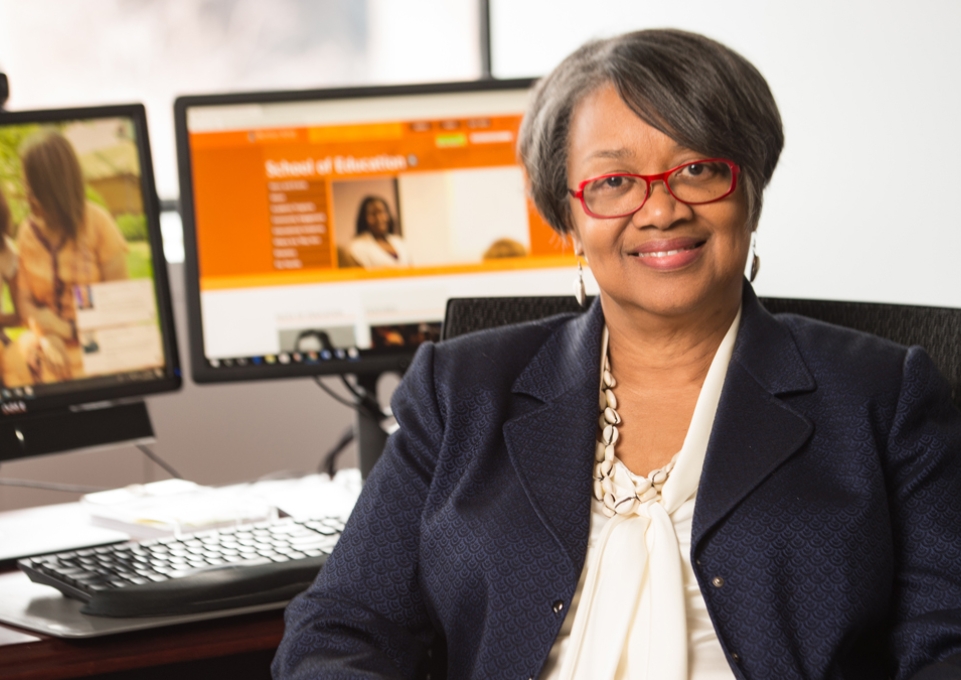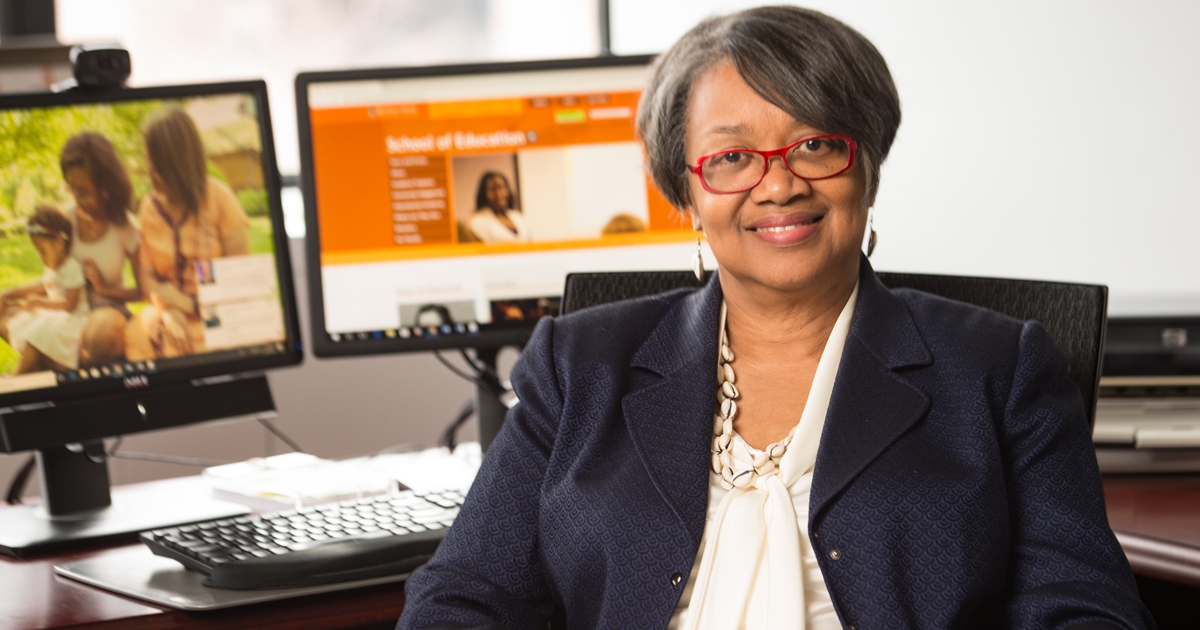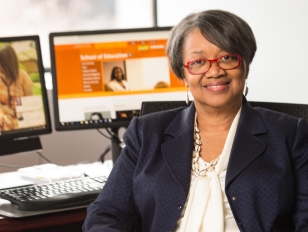
Sunday, March 8, is International Women’s Day, and to commemorate the achievements of powerful and progressive women worldwide, we spoke with Buffalo State College President Katherine Conway-Turner, the second woman to serve in the position.
During her time in leadership, Conway-Turner has implemented a number of changes that have propelled the college forward, including reflecting the college’s racial and gender diversity with a new cabinet of leaders, most of whom are first-generation college students, like many of the students attending Buffalo State.
Reflecting on her experiences, the president shared her perspectives on role models, motherhood, overcoming adversities, and changes she would like to see for women across the world.
Q. Who were some women you considered your heroes growing up, or even still today?
When I was growing up, it was my great-grandmother. She was such an amazing community person; everybody knew her. She actually passed away when I was pretty young, but I loved her spirit and her sense of community, and the kind of care she displayed in her interactions with everyone. Even to this day, I often evoke her and think of her.
I was also attracted to writers, the Jane Austens of the world, people who wrote about women-centered experiences. I’m a first-generation college student, and I wasn’t around any people who were writers or professionals, but I loved to get in the heads of literary figures. I liked to read about every era, but I particularly like reading about things in the past and struggles that women had, so all the women writers were really exciting to me.
When I got to college and began to meet professors who were significant to me, then I could really relate to highly educated women. There was a woman named Brenda Crawley who was a professor of social work, which wasn’t my major, but I took a course with her. I remember being really taken with her journey and her strength as a model for myself, which is one of the reasons why I think it’s so important that we provide models for our students who look like them and who have similar journeys. Because it’s easier to see yourself succeed if there’s some example in the real world.
Q. Last year, you were named a Woman of Distinction by the Girl Scouts of WNY. What was it like receiving that honor?
I’m a former Girl Scout, and Girl Scouting was always an important part of who I was. The kinds of things that Girl Scouts stood for were always things that I appreciated and that I felt were very much emblazoned in my core. So, to step forward all those years and then the Girl Scouts decided to honor me, that was one of the best things that has ever happened in my life. It was just so full-circle. My family teases me even today; they’ll say, “Oh, she’s just a Girl Scout,” and to me, that is a badge of honor. If you’re calling me a Girl Scout, you’re saying that I’m doing things the right way for the right reasons.
Q. We often hear of the disadvantages of being a woman in the workforce, but would you consider there to be any advantages?
One of the advantages of being a woman is that you realize when you move ahead, that it’s because of your merits, and you know your accolades are for the things that you’ve done. Even though what people see may come from a place of discrimination, it actually should give you a sense of empowerment that you know you can do it. If you’re at the table, then you know that you’re not the mediocre one at the table; you’re one of the best people there.
I also think that women are more likely to think in tune with the whole of the organization. We need to capitalize on each and every person around us who has a gift for this world. Every time we don’t see a potential gift, our world is losing something. I think that a woman-centered approach is to try to scan your environment and to bring along as many people as possible, women and men, and not rely on the one to raise their hand or the one whose name you already know.
Q. How has overcoming obstacles as a woman shaped your goals or motivated you?
My experiences have shown me that through hard work and perseverance, you can do almost anything you want to do. It gives me a greater sense of patience than I would have had otherwise; it is a virtue to be persistent and to continue to work in the face of obstacles.
Also, I’ve been in situations where people have tried to dissuade me from doing something, and that has helped me understand that nobody can define me but myself. One of the things I have experienced numerous times are people who I think were really trying to be helpful, but who have given me comments that were limiting.
One example I can think of is when I was going to college. I was working at the school hospital and I was thinking about going to graduate school, and my supervisor said, “Well, why would you want to go to graduate school? You’re getting ready to finish your degree, you’ll get married; I don’t know why you’d want to do that.” I’m sure that was probably well-intentioned from his perspective, but that was such a limiting concept.
I learned from various obstacles that people have the right to say whatever they want; you have the right to listen to advice that you feel is consistent with you. Realize that you don’t have to go in the direction that someone else wants you to go. Generally, when I’m talking to younger women about moving their career in some way, what they’re struggling with is that sense of agency. You have to remember that everybody started on a journey; maybe you won’t be clear at this moment, but maybe next month you will. That clarity is something you have to develop within yourself.
Q. One of the biggest stereotypes with women in professional settings is that they have to choose either career or family. How were you able to balance leadership roles in your higher-ed career while raising a family?
When the kids were little, I was a faculty member, which was a wonderful position because predictably, you can have your summers free from the day-to-day work of teaching. When the kids were out of school, I was out of school, so it was a great career for balancing having children. My kids would tell you that they feel like they grew up on a campus. I brought them to events on campus, theater, and museums, which enriched their lives, but it also allowed me to be where I needed to be.
I didn’t move into administration until my two older daughters graduated and my youngest was in junior high, so it was kind of an easy shift at that point. But I do remember being up really late a lot, because when you’re working all day and you’ve got all these people to feed, when are you going to cook? There was the hassle with getting them to bed, then running to the grocery store and coming home and cooking. I don’t know how I existed on such a small amount of sleep for that long period of time, but I do remember that.
Q. As a mother of three daughters, what were some of the most important values you made sure to instill in them as young women?
I wanted them all to be firmly on their own two feet, and to feel good about who they were in their own distinctiveness. My oldest daughter is more into community work, my middle daughter is an art conserver, and my youngest daughter is a researcher in child development, so they do really different things. The most important thing was allowing them to find their own paths and then supporting them on their journeys through childhood and adulthood.
All my daughters are very socially conscious people, and it was important to me that my children cared about the world they lived in and cared about other people. I purposely had them serve with me, doing community service, visiting elders, and doing things to help them see that as important as their world is, there were people outside of themselves who oftentimes didn’t have what they had.
[My husband and I] also wanted our kids to see the world as a global, connected place, so we traveled with them. I did not want to raise children who had a sense of otherness toward people outside of themselves who look different from them and who came from different perspectives.
And of course, I wanted them to be empowered as women, so we made sure they got the message that they were just as good as anybody else out there and that they had much to give the world.
Q. Are there any specific women-led student groups on campus that you feel are making a positive impact in campus diversity and involvement?
I think P.U.L.S.E. is a really empowering group for young women, but I’ve noticed that many of the groups on campus are run by women, even though they’re not women’s groups. For the last year, the entire USG board were all women [with the exception of senators]. I’ve noticed that women do rise in leadership on this campus and a lot of general clubs. There are a lot of opportunities for women to lead here and, of course, being in college and leading in a club or an organization is a really good experience and good training for leadership.
Some of the student leaders I work with directly are not necessarily in a club or group, but they work with the Civic Engagement Center or the Career Center, and many of them are women, as are many of the people who rise to the top for leadership and undergraduate research. It’s good to lead an organization or a group because you learn some skills about working with others like resolving conflicts and compromising, but it’s also good to just rise as a woman leader in your discipline in research and engagement, because you’re then working with professionals and holding your own in that arena. They’re different skills but both really good skills to develop, and I see our students do both.
Q. As the climate continues to change for women worldwide, what are some more changes you would like to see in terms of diversity, equality, and inclusion for women?
Focusing on just the U.S., we are still in a world where women are not seen as the most likely leader in the room, and it really plays out in the political arena. The things that they say to our women who are seeking political appointments are just jaw-dropping. Our work is really for people to realize that you’re not gifted because you have a Y chromosome; that’s not where the gift comes from. We need to look at individuals in potential leadership and look at their traits, and not have this rigid sense in our minds that this person needs to come in a certain package. Until we do that, we’re going to keep replicating this nonsense that we’re seeing.
The breaking out of the #MeToo movement certainly has been a positive thing, that now people outside of women know this awful stuff is happening. Hopefully people will no longer assume that if you have power over a group of women, you can harass them. Not only does that erode the individual woman’s soul and her future, but it continues this toxic culture that doesn’t allow you to benefit from the woman and the gifts that she has.
I think exposing these negative things will be helpful, if we can keep them exposed until we fix them. I’m a total optimist, so I’m hopeful that we will do better moving forward, but we do have a long way to go.



